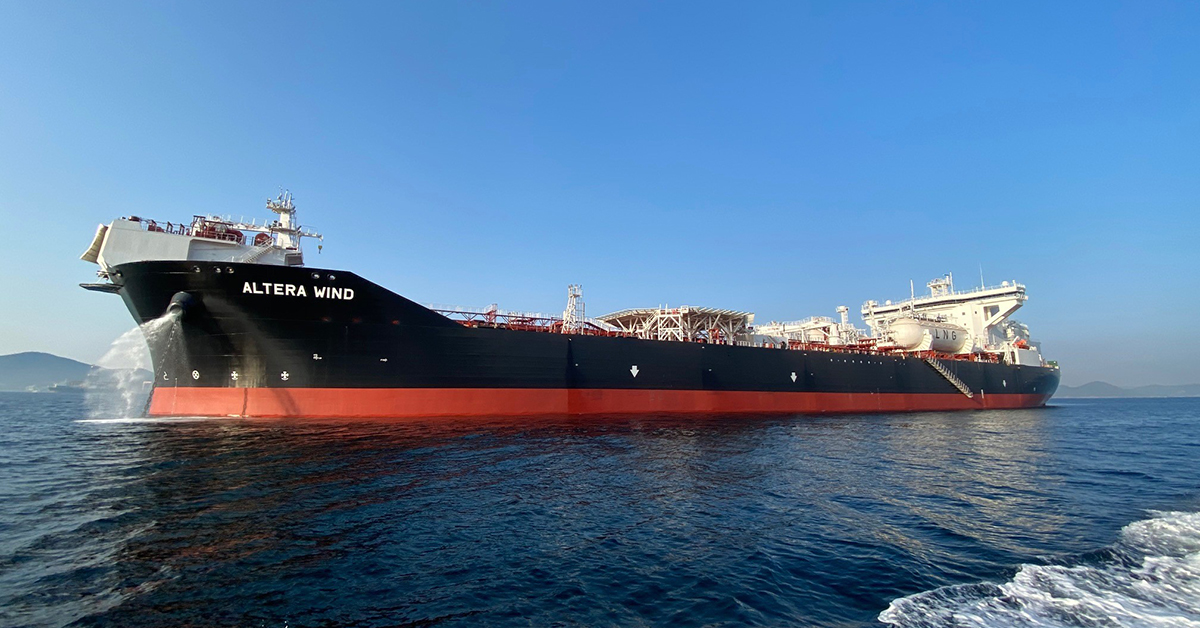Altera's Carbon Capture Pilot Project Takes on Shipping Emissions
Published by Todd Bush on August 16, 2024
Carbon Capture, Utilisation and Storage (CCUS) is one of multiple new technologies that Skuld's membership is developing to reduce greenhouse gas (GHG) emissions. Skuld member, Altera Infrastructure, is at the forefront of this development. Through the Green Shipping Programme (GSP), they are conducting a pilot project for a CCUS solution for their shuttle tankers.

>> In Other News: Opening the Door to a Carbon-Free Future: Heimdal’s Bold Move in Carbon Capture
Christian Fjell, Director of Sustainability at Altera, is leading the pilot project. He enthusiastically emphasizes:
"The key findings in the pilot project will give a greater insight into CCUS, not just for the pilot itself, but also the feasibility to include the CCUS technology in future newbuildings."
Carbon Capture and Storage (CCS) is the process of separating CO₂ molecules from other gases in industrial usage and transporting them to permanent storage facilities. The International Energy Agency (IEA) includes CCS as a vital part of the scenario for reaching net zero by the middle of the century. Despite this, the CCS development remains at a low pace. Around 50 million tonnes are stored annually today; however, this needs to increase to 7.6 gigatonnes by 2050 in the Net Zero Emission Scenario (NZE Scenario). CCS development is thus not even near the pace required for this scenario. For this reason, Skuld sees it as especially important to support pioneers like Altera.
For Altera, it is key to keep all options available for the future design of their vessels. CCUS is one of many energy combinations on the table for reducing emissions. Christian explains that they continuously monitor their "Position Paper", an in-house developed document for assessing the current status of fuel technologies' availability and maturity.
"The position paper gives us an overview of the status of the different technologies available for our trade. Keeping track of status and development is critical. If there are gaps or developments in the technologies, we can actively strengthen our knowledge by taking initiatives like we do with CCUS through the Green Shipping Programme."
Utilization of captured carbon is an appealing aspect of the Net Zero Emissions by 2050 Scenario. Captured carbon could be utilized in other industries, and as Altera operates in the North Sea, they note: "For instance, greenhouses in the Netherlands and Belgium require substantial amounts of CO₂ and could be an alternative for utilization. However, there needs to be a predictable regulatory framework to give credits equal to its usage in the EU. This is not yet in place, which makes it difficult to rely on utilization as part of the concept we build for this pilot."
Altera Infrastructure also actively investigates the entire value chain through its Stella Maris project. Stella Maris is a "large-scale, flexible, scalable maritime logistics solution for captured CO₂ from industrial sources, both large and small." The project aims to store 10 million tonnes of CO₂ annually.
A typical shuttle tanker would likely emit 15,000 – 40,000 tonnes of CO₂ annually, depending on size, trade, and activity. With a potential storage capacity of millions of tons for projects like Stella Maris, a substantial number of vessels would be required to make such a project feasible and economically sustainable for shipping alone. Therefore, land-based industries will be necessary for developing storage infrastructure. However, if shipping were to be a part of a well-functioning infrastructure, the potential for including a considerable number of vessels in the carbon capture infrastructure is possible.
Pilot projects, like the one Altera is leading, become vital sources of information and knowledge for Skuld. Being actively involved in the transition gives Skuld greater insight into changes in risk. With better risk assessment, Skuld can serve their members better today and in the future. Being involved in the GSP strengthens Skuld's knowledge of the transition to lower emissions and serves as an important arena to help build a network with industry stakeholders who are creating solutions for the development of the industry.
Subscribe to the newsletter
Daily decarbonization data and news delivered to your inbox
Follow the money flow of climate, technology, and energy investments to uncover new opportunities and jobs.
Latest issues
-
Kita's $29M Bet Signals Carbon Insurance Is Here
Inside This Issue 🛡️ Kita's $29M Bet Signals Carbon Insurance Is Here 🏗️ CCI BioEnergy Selects Arcadis As Design-Engineer Partner Under Master Service Agreement 🤝 Tapestry and Climeworks Announce ...
-
Cummins Quit Electrolyzers. Electric Hydrogen Didn't.
Inside This Issue ⚡ Cummins Quit Electrolyzers. Electric Hydrogen Didn't. 🧪 New Electrified Method Captures Carbon Dioxide From Air 🌾 Iowa Could Be on the Cusp of a Hydrogen Rush; Lawmakers Weigh ...
-
Inside America’s Carbon Capture Reality Check
Inside This Issue ⚡ Duke Energy Florida Goes Live With First 100% Hydrogen System ✈️ Air bp Signs Agreement With Airbus on Flight Services and Fuel Supplies in Europe 🌊 Pairing Reefs and Mangroves...
Company Announcements
-
Vancouver, British Columbia--(Newsfile Corp. - February 18, 2026) - Element One Hydrogen & Critical Minerals Corp. (CSE: EONE) ("Element One" or the "Company") is pleased to announce the format...
-
CCI BioEnergy Selects Arcadis As Design-Engineer Partner Under Master Service Agreement
First project under the agreement will contribute to doubling the processing capacity of Toronto’s Disco Road Organic Processing Facility Toronto, ON – Arcadis (EURONEXT: ARCAD) is pleased to anno...
-
QIMC Reports Diamond Drilling Underway at West Advocate Hydrogen Project, Nova Scotia
Montreal, Quebec-- Québec Innovative Materials Corp. QIMC (OTCQB: QIMCF) (FSE: 7FJ) ("QIMC" or the "Company") announces that diamond drilling operations commenced on February 17, 2026, at its West ...
-
Seaweed Farming Could Remove Millions of Tons of CO₂ Each Year, Study Finds
Seaweed farming is a key strategy for carbon dioxide removal (CDR), offering both climate mitigation and ecological benefits. A recent study published in Communications Sustainability examined how ...